|
|
|
Sort Order |
|
|
|
Items / Page
|
|
|
|
|
|
|
| Srl | Item |
| 1 |
ID:
110751
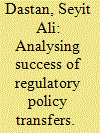

|
|
|
|
|
| Publication |
2011.
|
| Summary/Abstract |
Economic regulation of public utilities has become a worldwide phenomenon with the preceding privatisation stream. It is questionable to transfer regulatory models hastily without customising the policy options or introducing necessary institutional reforms enabling the achievement of expected results of regulatory reform. Institutional configuration of a country affects credibility of regulatory commitments, quality of regulatory design, and way of policy transfer. Turkey's energy market regulation experience confirms the decisive role of institutions in shaping the regulatory framework.
|
|
|
|
|
|
|
|
|
|
|
|
|
|
|
|
| 2 |
ID:
133233
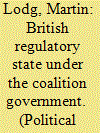

|
|
|
|
|
| Publication |
2014.
|
| Summary/Abstract |
What have been the effects of coalition government on the British regulatory state? This article argues that the politics of regulation have been largely about a continuation of existing patterns, namely volatile stability rather than more far-reaching change. The British regulatory state continues to be defined by boundary conflicts between the world of 'politics' and 'regulation', by conflicting calls for centralisation and decentralised autonomy, and by tensions between the wish to 'reduce' regulation and the realisation of inherent complexities.
|
|
|
|
|
|
|
|
|
|
|
|
|
|
|
|
| 3 |
ID:
150026
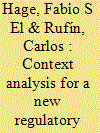

|
|
|
|
|
| Summary/Abstract |
This article examines what would have to change in the Brazilian regulatory framework in order to make utilities profit from energy efficiency and the integration of resources, instead of doing so from traditional consumption growth, as it happens at present. We argue that the Brazilian integrated electric sector resembles a common-pool resources problem, and as such it should incorporate, in addition to the centralized operation for power dispatch already in place, demand side management, behavioral strategies, and smart grids, attained through a new business and regulatory model for utilities. The paper proposes several measures to attain a more sustainable and productive electricity distribution industry: decoupling revenues from volumetric sales through a fixed maximum load fee, which would completely offset current disincentives for energy efficiency; the creation of a market for negawatts (saved megawatts) using the current Brazilian mechanism of public auctions for the acquisition of wholesale energy; and the integration of technologies, especially through the growth of unregulated products and services. Through these measures, we believe that Brazil could improve both energy security and overall sustainability of its power sector in the long run.
|
|
|
|
|
|
|
|
|
|
|
|
|
|
|
|
| 4 |
ID:
168663
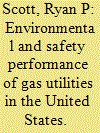

|
|
|
|
|
| Summary/Abstract |
The performance of energy service providers has important environmental and safety consequences in local communities. This paper uses a novel dataset compiled from operator reports and infrastructure monitoring data obtained from three different US federal agencies to assess the performance of retail gas utilities nationwide in terms of addressing gas leaks and minimizing leaked volume. Our panel data set includes yearly observations for 727 retail gas utilities from 2009 to 2017. We show that safety hazards and environmental costs of gas leaks are widespread across providers that vary in terms of ownership, size, and region. We then use a series of Bayesian hierarchical models to regress four outcome variables—hazardous leaks, end-year unfixed leaks, total gas volume leaked, and significant incidents—on infrastructure conditions, regional service context, and socio-economic service population characteristics. Unlike what is observed in other critical infrastructure cases such as drinking water, socio-economic conditions are not strongly predictive of service outcomes. Additionally, public utilities exhibit better environmental performance on average, and no difference in maintenance backlogs. Because the environmental costs of poor performance--primarily in terms of methane greenhouse gas emissions--are predominantly social, policy tools such as consolidation and privatization are unlikely to improve environmental outcomes.
|
|
|
|
|
|
|
|
|
|
|
|
|
|
|
|
| 5 |
ID:
183573
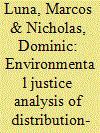

|
|
|
|
|
| Summary/Abstract |
A growing body of research shows that natural gas leaks at the distribution level are much more common and extensive than previously thought. Although scholars and advocates have raised alarms about the climate change and economic significance of these leaks, there has been little consideration of the problem from an environmental justice perspective. Using recently available high resolution leak data, this analysis of natural gas leaks across the state of Massachusetts shows that People of Color, limited English speaking households, renters, lower income residents, and adults with lower levels of education are disproportionately exposed to natural gas leaks and that their leaks take longer to repair, as compared to the general population, and particularly as compared to White residents and to homeowners. This pattern is evident for all leaks in the state, for leaks disaggregated by leak class or grade, and for leaks disaggregated by utility. This analysis shows that natural gas leaks are an environmental justice issue warranting further study and policy attention.
|
|
|
|
|
|
|
|
|
|
|
|
|
|
|
|
| 6 |
ID:
097495
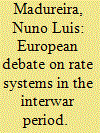

|
|
|
|
|
| Publication |
2010.
|
| Summary/Abstract |
This article describes a particular branch that evolved in the diffusion of electrical rate systems in twentieth-century Europe and the debate that ensued between the competitive, promotional and cost based approaches. Three major questions are addressed: What factors and historical circumstances favoured the emergence of more or less efficient pricing schemes? Why did some enterprises opt for promotional rates while others defended the cost based alternative? What is the historical origin of marginal cost pricing? It is shown how the volatility of the costs that characterize hydro-electric production made this particular technology very sensitive to a cost approach towards pricing and to a seasonal and time-of-day perspective on rate systems.
|
|
|
|
|
|
|
|
|
|
|
|
|
|
|
|
| 7 |
ID:
092785
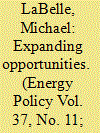

|
|
|
|
|
| Publication |
2009.
|
| Summary/Abstract |
During the 1990s, limited investment opportunities in Western Europe, the opening of the energy markets in Eastern Europe, and the future expansion of the European Union (EU) prompted an expansionist strategy by energy companies from the original EU member states. In this paper, the acquisition and divestiture activities and strategies of utilities from France and Germany are analyzed in the context of the 2004 and 2007 EU enlargements. Through quantitative and qualitative data analysis, including the development of two case studies, the strategy for expansion and evolution in new member states is examined. The results demonstrate a concerted effort to establish economies of scale through ownership of distribution companies. A change in strategy occurs as these privatization opportunities disappear. Generation and trading activity become the growth area for these companies as electricity supply becomes another factor that can contribute to the economies of scale. Recent EU-supported efforts towards regionalization of electricity markets, positions these companies well due to their strong regional presence. This paper will explore these issues in the context of ownership and geographic distribution.
|
|
|
|
|
|
|
|
|
|
|
|
|
|
|
|
| 8 |
ID:
179682


|
|
|
|
|
| Summary/Abstract |
About 1 in 10 rooftop solar photovoltaic (PV) customers who sign a contract to install a PV system cancel their contract before the system is installed. Although some cancelation risk is inherent in the solar industry, there may be ways to reduce cancelation volume, such as reducing project delays. Delays can occur at each stage of PV adoption processes, which take several weeks to months from contract signature to system operation. Using data from a recent survey of PV installers, we explore the factors that explain PV project delays and cancelations. The survey data suggest that PV adoptions take about 16 weeks, on average, from contract signature until system operation. Survey respondents consistently identified permitting, inspection, and interconnection (PII) processes as key drivers of project delays. Most respondents then suggested these PII-related delays increase contract cancelations. However, larger-scale installers report higher cancelation rates, and these installers rank changes in customer financial situations higher than PII-related delays as the main cause for cancelations. Most respondents also reported avoiding jurisdictions with particularly onerous PII requirements or charging more in these jurisdictions. On balance, the results provide a rationale for measures to streamline PII processes to reduce delays and potentially mitigate cancelation risk.
|
|
|
|
|
|
|
|
|
|
|
|
|
|
|
|
| 9 |
ID:
137708
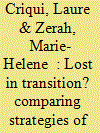

|
|
|
|
|
| Summary/Abstract |
This paper examines the notion of energy transition when implemented by private utilities. In 2000, the Delhi government privatized electricity distribution to three private distribution companies. Most research was concerned with the impact of privatization on energy reliability, tariff settings and regulation issues. This paper looks at two under-researched themes: the expansion of services to poorer neighborhoods and the rollout of clean energy policies. This focus allows to unpack the materiality of socio-technical systems, to analyze how energy infrastructures are being technically deployed on the ground and to identify which social approach is used. To detail the specific practices of each company provides a more nuanced and accurate understanding of the reform. In-depth analysis of the three private utilities show that they interpret the reform mandate differently: they use a varied range of technical tools; they respond differently to social concerns in poorer neighborhoods; and they have distinctive internal management choices and corporate cultures. All these four factors can strengthen or undermine the transition towards increased access and clean energy.
|
|
|
|
|
|
|
|
|
|
|
|
|
|
|
|
| 10 |
ID:
169865
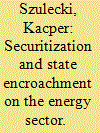

|
|
|
|
|
| Summary/Abstract |
As energy security becomes a key topic of policy debates, not least in Central and Eastern European states, which are vulnerable to gas supply disruptions from Russia, it has been suggested that EU energy policy becomes ‘securitized’. However, full securitization attempts, which not only identify threats but also call for exceptional measures to deal with them, are relatively rare in the energy sector. Why do governmental actors initiate securitizing moves aimed at implementing exceptional measures in the energy sector, and what explains the acceptance of certain moves or measures and dismissal of others? This paper looks at Poland, comparing two examples of such moves. Drawing on a primary document analysis, the paper shows how a shared socio-technical imaginary provided an anchor for the successful securitization of the nuclear project, while liberal market discourses limited audience acceptance of the securitizing move in the power sector. Securitization appears to be a mechanism triggered when core state powers over energy are challenged from below (civil society, market actors) and above (supranational institutions), particularly in already securitized contexts. The paper concludes with the value added of Securitization Theory for energy policy studies and lays out a Critical Energy Security Studies agenda, which can build on it.
|
|
|
|
|
|
|
|
|
|
|
|
|
|
|
|
|
|
|
|
|